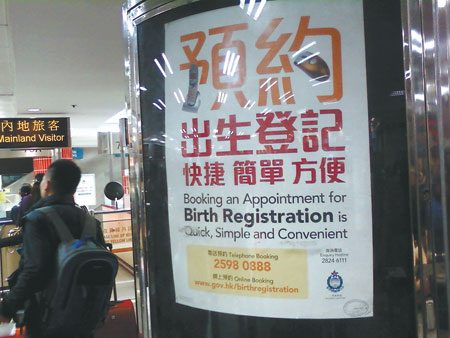'Control number of mainland births in HK'
 0 Comment(s)
0 Comment(s) Print
Print E-mail China Daily, March 7, 2012
E-mail China Daily, March 7, 2012
 |
|
A bilingual advertisement for Hong Kong birth registration at Luohu port in Shenzhen, Guangdong province. |
"Our department only has control over public hospitals and only the Hong Kong government can talk to private ones about a limit," he added.
"We've kept most of the maternity beds at public hospitals for local mothers, but there are frequent complaints about a strain on beds at private ones," Wu said.
Chan Yuen-han, a CPPCC member from Hong Kong, also called on the Hong Kong government to issue measures to prevent mainland mothers from giving birth in the special administrative region.
"Hong Kong has limited resources, not only in providing beds for pregnant women but in education and healthcare. If there are more women from the mainland giving birth in Hong Kong, we will face a big shortage of social resources in the near future," Chan said.
Sources with the Hong Kong Hospital Authority said the government intended to limit the number of pregnant women from the mainland giving birth in Hong Kong to 35,000 at both private and public hospitals each year.
"The limitation should not been seen as a bias against mainland mothers. The existing Hong Kong government, to some extent, has failed to protect its residents' rights in previous years when many local pregnant women found it hard to give birth in Hong Kong," Chan said.
Peggy Tai, a spokeswoman for Queen Elizabeth Hospital, which is public, said the hospital would try to ensure that local pregnant women in Hong Kong have priority in using its maternity service.
Tai added that the public hospital has been recruiting doctors and nurses to strengthen its staff, in order to promote the quality of service.
Among an estimated 51,000 local pregnant women each year, several thousand choose to deliver babies at private hospitals, previous reports said.
Last year, of a total of 49,000 women delivering babies at private hospitals, 33,000 were from the mainland, according to Wu.
Yu Kai-man, head of the Obstetrics and Gynaecology department of Union Hospital, a private hospital, said they would be accepting fewer mainland mothers in the future and probably reduce the number by 10 percent next year.
More local pregnant women would be admitted and given better service in the hospital.
"We don't have enough obstetricians to handle the increase of total births," Wu said, adding that there are now about 1,000 obstetricians in Hong Kong.
The limit on pregnant women from the mainland was not discriminatory, he said.
"With sufficient hospitals and medical workers, we would surely welcome pregnant women from the mainland," he said, adding that it would be good for babies born to mainland mothers to stay in Hong Kong, to help relieve the local aging problem.





